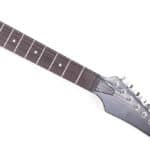When we are eager to get a new guitar, we pay attention to many issues we feel are important such as the model, the pickups, or how the guitar fits the amp. However, those are not the only remarkable features to bear in mind.
Have you ever thought about guitar size? Maybe not, but don’t worry. For those who are doing their first approaches to the world of guitar, this might be a confusing topic so let me explain to you.
If you are a little person or you have small hands some guitars can feel too big for you to play. Nevertheless, with practice and correct posture, you will be able to play almost any instrument. However, comfort is very important and you should look for sizes and shapes that better fit your body.
Through this article, I will try to explain every aspect related to guitar size. I will describe big and small guitar features to help you choose the option that suits you the best.
Is the size of a guitar a defining factor for players?
Although the size of a guitar affects the sound and playability, we cannot say that it is a defining factor to come to a decision. Like everything in life, this depends on the player.
If your seven years old child wants to start playing guitar, a full-sized guitar may be difficult for the kid to handle. In addition, it would be hard to learn chord shapes or scales because the instrument is too big and this makes playing uncomfortable.
Looks are not everything but could be important for some players.
The well-known guitarist Buckethead has his own signature guitars which are made 10% bigger because he feels like regular-sized instruments look like a toy hanging from their 6’ 6” body.
What is more, some short people use a smaller guitar in order not to look so tiny.
What are the downsides of getting a guitar too big for you?
Having a guitar too big can bring you some negative aspects. First of all, bulky instruments are also heavy.
Although straps are designed to distribute weight and make playing while standing more comfortable, your back will still suffer. You won’t be willing to continue playing because of the pain and the fatigue produced by the weight of your guitar.
Besides, some areas of the neck would be hard to explore. You might feel uncomfortable playing an instrument that is not made for your size.
What is more, every time you have to play live, carrying your instrument will be such a headache. You will be dealing with an immense heavy piece of wood from one place to another.
Is there a way around for playing a big guitar?
Maybe the instrument you own is too big for you but that does not mean that you cannot play it. Of course, it would be better if you get a proper-sized guitar but if it is not the case, try to practice your posture.
Playing with the right posture will help you to reach every section of the instrument in a better way. I suggest you use a strap, even if you are playing in a seated position.
This allows more freedom to your hands and arms. Place your guitar in your left leg if you are right-handed or in your right leg if you are left-handed.
This will give your playing hand the possibility to move to all positions easily.
Finally, try to raise the leg on which you place the guitar to relax your foot.
Besides, you should practice enough, but not too much.
Try not to over-practice!
Shorter, deliberate practice sessions are far more productive than playing for long hours on autopilot.
Although it is possible to play a bigger guitar, you should know that a correctly-sized instrument will ensure the correct position of your arms, hands, and wrists easily.
A larger instrument could affect your overall playing and could make it difficult to play a properly-sized instrument in the future.
What’s the best size of guitar for a woman or shorter people?
Normally this topic should be more focused on acoustic guitars. When we talk about smaller guitars we refer to the length scale being shorter.
Typically, 30 to 34 inches will be great for little children under the age of ten.
For adults a full-sized guitar will suit perfectly but, if you are in the middle, you can try a shorter scale guitar.
The shorter the scale length, the smaller the body and the shorter the neck. In the case of electric guitar, there are some models which are commonly little (Fender Mustang or Gibson SG, for instance) but, as a general rule, any electric guitar will be great.
Is hand size important at all for playing the guitar?
You may think that if your hands are little, you couldn’t play properly but that statement is false.
You might struggle when playing some chord positions (for example, barre chords and very open chord voicings) or even playing bass notes with your thumb, but it is not impossible.
Although having small hands could sound like a drawback, it also has its benefits.
For instance, E major or A major chords, which are the easiest chord shapes, can be really tough to play if you have thick or massive fingers.
Another interesting thing is some guitars have thinner necks. This will help you if you believe your hands are tiny.
What you have to consider is if there is an easier way for you to play what you find hard.
Are smaller guitars worse in any aspect?
To answer this question I would like to compare both of them. As a matter of fact, smaller guitars are more comfortable to hold or play than bigger pieces.
Moreover, little guitars possess a brighter tone while their counterparts have a greater potential for bass response.
Although many players might think that larger guitars have a big sound, tinier instruments can be shockingly more powerful.
So, the answer would be that smaller guitars are not worse but different in terms of sound.
This is due to they have less body mass which produces a different tone.
Check our articles about how different body shapes and guitar weights can influence an instrument’s tone.

Hello there, my name is Ramiro and I’ve been playing guitar for almost 20 years. I’m obsessed with everything gear-related and I thought it might be worth sharing it. From guitars, pedals, amps, and synths to studio gear and production tips, I hope you find what I post here useful, and I’ll try my best to keep it entertaining also.





